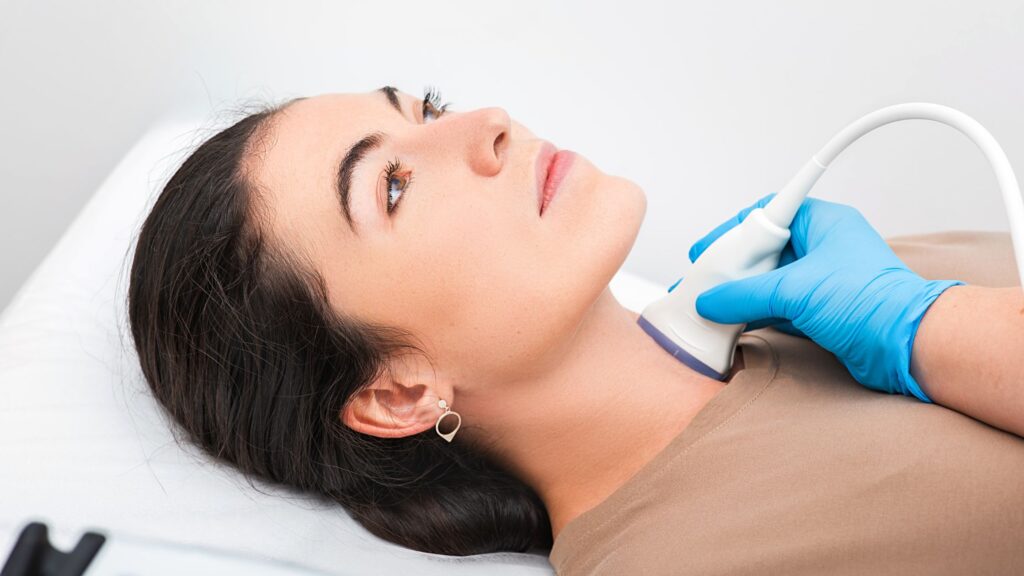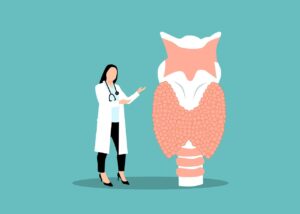Hypothyroidism refers to the reduced functioning of the thyroid gland or an underactive thyroid gland. By math, it means low levels of thyroid hormones (T4 & T4) and high levels of TSH. When thyroid hormones are low the pituitary produces TSH in an effort to get the thyroid to make more.
But at times the thyroid doesn’t respond and TSH continues to increase without an increase in the thyroid hormone levels. This condition is more common in women. And on the other hand, we have Hyperthyroidism where we have increased functioning of the thyroid gland or an overactive thyroid gland with high levels of T3 & T4 and low levels of TSH.
DO YOU KNOW?
Women are five to eight times more likely than men to suffer from hypothyroidism.
Individuals with celiac disease may also be at a risk
Hypothyroidism Symptoms
In its earliest stage, hypothyroidism may cause few symptoms, since the body has the ability to partially compensate for a failing thyroid gland by increasing the stimulation to it, much like pressing down on the accelerator when climbing a hill to keep the car going the same speed! As thyroid hormone production decreases, and the body’s metabolism slows, you may experience some of the following symptoms:
- Low BMR which leads to weight gain
- Bradycardia (low heart rate)
- Hypotension
- Edema
- Menstrual irregularities
- Fatigue
- Hormonal imbalance
- Forgetfulness
- Constipation
- Dry skin
- Muscle and joint pain
- Brittle Hair which leads to increased hair fall
- Increased risk of miscarriage
- Low body temperature which leads to increased cold sensitivity.
What causes Hypothyroidism?
- Genetic predisposition
- Treatment for Hyperthyroidism
- Thyroid injury
- Iodine deficiency
- Radiation therapy
- Thyroid surgery
- Other hormonal imbalance
- Certain Medications
- Autoimmune condition
Hypothyroidism Types
Autoimmune Hypothyroidism AKA HashimotoThyroiditis is the most common cause of hypothyroidism, where the body produces antibodies to attack and destroy the thyroid cells leading to drop in T3 & T4 production.
Let’s get into the details:
- Thyroid cells are damaged by triggers such as too much iodine, fluoride, metals, gluten consumption, bacterial and viral infections and not to forget too much stress
- Dying thyroid cells send out a signal to the immune system to save the thyroid gland from the villain aka invaders but apparently the immune cells get confused and accidently attack the thyroid gland instead because of the wrong message.
- Finally, the thyroid runs out of resources to regenerate thyroid cells and is no longer able to produce enough hormones
Causative factors of Hashimoto:
- Stress
- Poor diet and lifestyle
- Blood glucose imbalance
- Leaky Gut
- Vitamin D deficiency
Certain Diagnostic test to rule out Hashimoto Thyroiditis
- TPO Antibodies
- Thyroglobulin Antibodies
- Thyroid Hormone levels
- Reverse T3 levels
Now let’s see what are the normal Thyroid Hormones and TSH Levels and what levels indicate Hypothyroidism:
Reference lab ranges for Hypothyroidism
We must make sure to order a full thyroid panel to look at all these important thyroid values.
- TSH levels, Reference range:35-5uIU/ml, >4.0 is borderline High.
Ideally, we want to look at below 2! - Total T3: 80-200 ng/dl
Total T4: 4.5-11.2 mcg/dl
Free T3; 2.3-4.4pg/nil
Free T4: 0.7-2.0ng/dl
Reverse T3 :9.1-24.1ng/dl - Anti- thyroid antibody test to check for Hashimoto’s
Anti-TPO antibodies: Less than 15 mIU
Anti-TG antibodies: Less than 1 Mi
It is interesting to note we have another form of Hypothyroidism known as Subclinical Hypothyroidism.
Wherein, we see Elevated TSH levels while Thyroid Hormone that is T3 and T4 levels falls into the normal range, hence this form of Hypothyroidism mostly goes undiagnosed and untreated.

Lifestyle Interventions to help optimize Hyperthyroidism
- Acupuncture – work beautifully in correcting hormonal imbalances and inciting the body’s natural healing process.
- Exercise appropriately 30 minutes to an hour, 5 days a week. Cardio is great, weight training works excellent for hypothyroid and since the main concern here implying low BMR, weight training works best for increasing the BMR
- Meditation a day, can also indulge in yoga and tai chi
- Massage regularly- helps to get rid of toxins, reduces stress and lowers anxiety
- Can try dipping feet in Epsom salt water along with lavender oil drops, this helps to buffer cortisol levels and help keep the hormone balance in check
- The thyroid gland is sensitive to the exposure of electromagnetic field, hence turn of the computer and cell phones when not needed, keep electronics out of the bedroom, avoid using microwave ovens, and stay away from electronics an hour before going to bed and when it comes to phone, use ear buds, keep the phone away from the body and turn on airplane mode and turn off WIFI before sleeping
- Avoid plastics, including water bottles and food packaging, BPA-coated. Use glass or steel instead. Plastics are just not just a problem for the environment, Additionally, they contain chemicals as they break down or are heated up that can harm us. Chemicals like BPA or phthalates which are plasticizers. One of the things you really want to be aware of is you never want to heat plastics. Definitely you don’t want to heat plastics whether that’s in the microwave or having a bottle in your car that you leave on the seat and come back, and the water is really hot, the plastic has already leeched into it.
- Speak your truth, practice to express yourself truthfully
Ready to reclaim your vitality? Contact now to receive personalized nutritional insights from Karishmma Chawla and take the first step towards managing hypothyroidism naturally.
Learn more about thyroid and thyroid control foods.
HAPPY THYROID IS HAPPY YOU!





